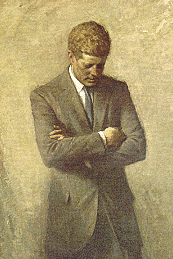 |
|
|
History
of the United States > Decades of Change |
|
By 1960 government had become increasingly powerful. The number of civilians employed by the federal government stabilized at 2.5 million throughout the 1950s. Federal expenditures passed $150 thousand-million in the 1960s. Most Americans accepted government's expanded role, even as they disagreed about how far that expansion should continue. In 1960, John F. Kennedy was elected president. At 43, he was the youngest man ever to win the presidency. Kennedy wanted to exert strong leadership to extend economic benefits to all citizens, but a razor-thin margin of victory limited his mandate and his policies were often limited and restrained. In October 1962, Kennedy was faced with what turned out to be the most drastic crisis of the Cold War: the Cuban Missile Crisis. When the Soviet Union installed nuclear missiles in Cuba, Kennedy decided on a quarantine to prevent Soviet ships from bringing additional missiles to Cuba, and he demanded publicly that the Soviets remove the weapons. After several days of tension, the Soviets backed down. Space was another arena for competition after the Soviet Union launched Sputnik in 1957. In April 1961, they capped a series of triumphs in space by sending the first man into orbit around the Earth. President Kennedy responded with a promise that Americans would walk on the moon before the decade was over and in July of 1969, Neil Armstrong stepped onto the moon's surface. Kennedy, assassinated in 1963, did not live to see this achievement. His successor, Lyndon B. Johnson, enacted a number of new laws from the Kennedy agenda, establishing social reform programs that he described as the "Great Society." The struggle of black Americans for equality reached its peak in the mid-1960s. Although civil rights legislation was enacted, some blacks became impatient with the pace of progress. Violence accompanied militant calls for reform. Unrest in the cities erupted, as black leaders criticized the nonviolent tactics of Dr. Martin Luther King. King's assassination in 1968 triggered race riots in over 100 cities. During President Johnson's six years in office, the United States involvement in Vietnam escalated. Although politicians tended to view the war as part of a necessary effort to check communism on all fronts, a growing number of Americans saw no vital American interest in Vietnam. Demonstrations protesting American involvement in the undeclared war broke out on college campuses. Increasingly unpopular, President Johnson decided not to run for a second full term. Richard Nixon was elected president in 1968. Nixon negotiated a peace treaty with North Vietnam and a number of other diplomatic breakthroughs. He opened ties to the People's Republic of China and successfully pursued a policy of detente with the Soviet Union. In 1974, he resigned from office as it became clear that Congress was about to impeach him for White House involvement in the Watergate cover-up. |
||
| Texts
are abridged from U.S. State Department IIP
publications and other U.S. government materials. |
||
|
What
kind of information materials are available?
CD: These documents are available in fulltext format on the About the USA CD-ROM. Teachers: Request a copy for classroom use. L: Selected documents are available in German as well as other languages, including Arabic, Chinese, French, Spanish, Persian and Turkish. |
DISCLAIMER
Any reference obtained from this server to a specific commercial product, process, or service does not constitute or imply an endorsement by the United States Government of the product, process, or service, or its producer or provider. The views and opinions expressed in any referenced document do not necessarily state or reflect those of the United States Government. |
 U.S. Diplomatic Mission to Germany /Public Affairs/ Information Resource Centers Updated: April 2008 |
